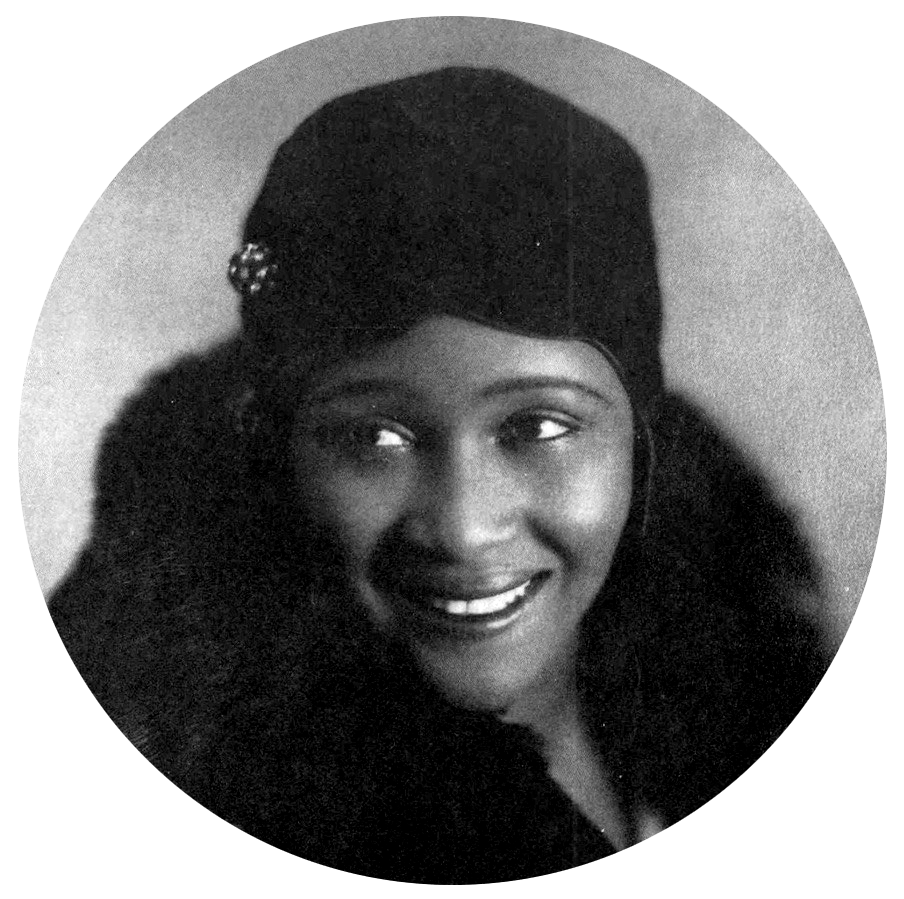 A belle of the blues with a head for business and a visceral gift as a songwriter, Victoria Spivey enjoyed a long career that took her from the role of ingenue to that of queen mother. Along the way she was a theater pianist, movie star, comedienne, bandleader, manager, church organist, record label owner, historian, and an inspiration to Bob Dylan and many others. Spivey was born on October 15, 1906, (or November 12 in one official document) in Houston, Texas, where her father and brothers had a string band. Two of her sisters, Addie (“Sweet Peas”) and Elton (“The Za Zu Girl”) became blues recording artists, but Victoria’s talent stood out, and the family sent her to St. Louis to pursue a singing career like her lifelong friend from Houston, Sippie Wallace. Spivey hit it big with her first record, the risqué “Black Snake Blues,” in 1926 and wrote many more songs for herself and other artists. “Blues Is My Business” would become her motto, and she started taking care of matters early on by suing her publisher for royalties in 1928.
A belle of the blues with a head for business and a visceral gift as a songwriter, Victoria Spivey enjoyed a long career that took her from the role of ingenue to that of queen mother. Along the way she was a theater pianist, movie star, comedienne, bandleader, manager, church organist, record label owner, historian, and an inspiration to Bob Dylan and many others. Spivey was born on October 15, 1906, (or November 12 in one official document) in Houston, Texas, where her father and brothers had a string band. Two of her sisters, Addie (“Sweet Peas”) and Elton (“The Za Zu Girl”) became blues recording artists, but Victoria’s talent stood out, and the family sent her to St. Louis to pursue a singing career like her lifelong friend from Houston, Sippie Wallace. Spivey hit it big with her first record, the risqué “Black Snake Blues,” in 1926 and wrote many more songs for herself and other artists. “Blues Is My Business” would become her motto, and she started taking care of matters early on by suing her publisher for royalties in 1928.
“T.B. Blues,” another popular record, was one of her many stark, moaning blues on OKeh, Victor, Vocalion, and Decca to employ grim, somber, or deathly themes. Blind Lemon Jefferson, Lead Belly, John Lee Hooker, and many others recorded her songs. “You Done Lost Your Good Thing Now,” written with her husband, trumpeter Rubin Floyd, was a duet with Lonnie Johnson, later covered by B.B. King. Spivey’s sessions included stellar accompanists Louis Armstrong, King Oliver, Tampa Red, and many others. She earned lasting fame playing “Missy” in the historic all-black 1929 film Hallelujah! She also led an orchestra and became wife and manager to famous tap dancer Billy Adams. Like her idol Ida Cox, she continued to work theaters and nightclubs during and after the Great Depression, which put many other blues women out of business.
After living in Moberly, Missouri with her sister Addie and their mother, she moved to Chicago and then New York, buying a home in Brooklyn. In the 1950s she sang at jazz clubs and played in church but only embarked on a career comeback in the 1960s with the support of jazz and blues buff Len Kunstadt, who became her companion and manager of the label they launched, Spivey Records. In 1961 Spivey also recorded for Prestige Bluesville. With her regal reputation and friendships in the blues world, “Queen Vee” was able to entice many legendary blues figures to record for her label, at the same time nurturing up-and-coming talent including Bob Dylan, who recorded with her and Big Joe Williams on March 2, 1962. Dylan made no secret of his affection for Spivey, and a photo of the pair adorns the back cover of his New Morning album. The Spivey Records catalog includes music by the Muddy Waters band, Willie Dixon, Otis Spann, Lonnie Johnson, Roosevelt Sykes, Sonny Boy Williamson, and many more.
Spivey remained a coy, charismatic performer, touring Europe with the 1963 American Folk Blues Festival, playing the Ann Arbor Blues & Jazz Festival, the Philadelphia Folk Festival and others, gracing various documentaries, and continuing to appear in New York until shortly before her death from a hemorrhage on October 3, 1976. As befitting her professional endeavors, collections of her business and personal papers and memorabilia are archived at Emory University and the Rutgers Institute of Jazz Studies.
